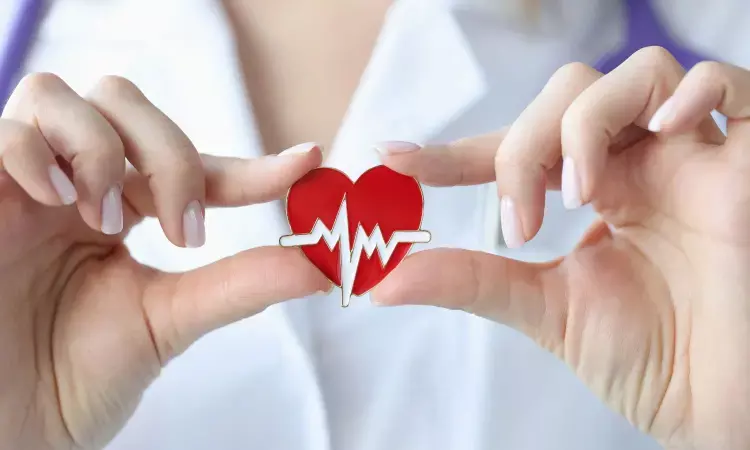- Home
- Medical news & Guidelines
- Anesthesiology
- Cardiology and CTVS
- Critical Care
- Dentistry
- Dermatology
- Diabetes and Endocrinology
- ENT
- Gastroenterology
- Medicine
- Nephrology
- Neurology
- Obstretics-Gynaecology
- Oncology
- Ophthalmology
- Orthopaedics
- Pediatrics-Neonatology
- Psychiatry
- Pulmonology
- Radiology
- Surgery
- Urology
- Laboratory Medicine
- Diet
- Nursing
- Paramedical
- Physiotherapy
- Health news
- Fact Check
- Bone Health Fact Check
- Brain Health Fact Check
- Cancer Related Fact Check
- Child Care Fact Check
- Dental and oral health fact check
- Diabetes and metabolic health fact check
- Diet and Nutrition Fact Check
- Eye and ENT Care Fact Check
- Fitness fact check
- Gut health fact check
- Heart health fact check
- Kidney health fact check
- Medical education fact check
- Men's health fact check
- Respiratory fact check
- Skin and hair care fact check
- Vaccine and Immunization fact check
- Women's health fact check
- AYUSH
- State News
- Andaman and Nicobar Islands
- Andhra Pradesh
- Arunachal Pradesh
- Assam
- Bihar
- Chandigarh
- Chattisgarh
- Dadra and Nagar Haveli
- Daman and Diu
- Delhi
- Goa
- Gujarat
- Haryana
- Himachal Pradesh
- Jammu & Kashmir
- Jharkhand
- Karnataka
- Kerala
- Ladakh
- Lakshadweep
- Madhya Pradesh
- Maharashtra
- Manipur
- Meghalaya
- Mizoram
- Nagaland
- Odisha
- Puducherry
- Punjab
- Rajasthan
- Sikkim
- Tamil Nadu
- Telangana
- Tripura
- Uttar Pradesh
- Uttrakhand
- West Bengal
- Medical Education
- Industry
Intranasal etripamil promising for AF patients with rapid ventricular rate: Phase II ReVeRA-201 study

UK: Etripamil nasal spray provides quick relief for atrial fibrillation (AF) patients accompanied by a rapid ventricular rate (VR), results from a phase II ReVeRA-201 study have shown. The findings were presented at the American Heart Association 2023 Scientific Sessions and published in Circulation: Arrhythmia and Electrophysiology.
"Intranasal 70 mg etripamil lowered ventricular rate and improved treatment satisfaction and symptom relief," the researchers wrote. "These data support further development of self-administered etripamil for treating atrial fibrillation-rapid ventricular rates (RVR)."
The multicenter, phase 2, randomized, controlled study conducted in Netherlands and Canada showed that the mean maximum reduction in VR was greater with etripamil versus placebo (34.97 vs 5.06 bpm). Moreover, the median time to get to that point with active treatment was just 13 minutes. This was accompanied by significant improvements in patient-reported satisfaction and symptom relief. The most common adverse events were related to the site of drug administration, with a low rate of serious adverse events.
Despite chronic therapies, atrial fibrillation leads to rapid ventricular rates often needing intravenous (IV) treatments. Etripamil is a fast-acting, calcium-channel blocker administered intranasally and impacts the atrioventricular node within minutes. A John Camm, St. George's University of London, London, United Kingdom, and colleagues aimed to evaluate the safety and efficacy of etripamil for VR reduction in patients presenting urgently with AF-RVR (VR ≥110 bpm).
It included patients presenting urgently with atrial fibrillation-rapid ventricular rates. They were randomized in a ratio of 1:1 to receive etripamil nasal spray (NS) 70 mg (n=27) or placebo-NS (n=29).
The primary objective was to show etripamil's effectiveness in reducing VR in AF-RVR within 60 min of treatment. Secondary objectives evaluated achievement of VR <100 bpm, reduction by ≥10 and ≥20%, treatment effectiveness and relief-of-symptoms; additional measures to 360 min and adverse events (AEs).
69 patients were randomized, and 56 were dosed with etripamil or a placebo. The median age was 65 years; 39% were female; proportions of atrial fibrillation types were similar between groups.
Based on the study, the researchers reported the following findings:
- The difference of mean maximum reductions in VR over 60 min, etripamil vs placebo, adjusting for baseline VR, was -29.91 bpm. VR reductions persisted up to 150 min.
- Significantly greater proportions of patients receiving etripamil achieved VR reductions <100 bpm (with longer median duration <100 bpm), or VR reduction by ≥10% or ≥20%, vs placebo.
- VR reduction ≥20% occurred in 66.7% of patients in the etripamil arm and no patients in the placebo.
- Using the Treatment Satisfaction Questionnaire for Medication-9, there was a significant improvement in satisfaction with symptom relief and treatment effectiveness with etripamil vs placebo.
- Serious adverse events were rare; 1 patient in the etripamil arm experienced transient severe bradycardia and syncope, assessed as due to hyper-vagotonia.
"The findings indicate a potential role of etripamil in reducing the ventricular rate in AF patients with a high ventricular rate," the researchers concluded. "Future investigation is warranted with at-home, self-administered etripamil."
Reference:
Camm AJ, Piccini JP, Alings M, Dorian P, Gosselin G, Guertin MC, Ip JE, Kowey PR, Mondésert B, Prins FJ, Roux JF, Stambler BS, van Eck JWM, Al Windy N, Thermil N, Shardonofsky S, Bharucha DB, Roy D. A Multicenter, Phase 2, Randomized, Controlled Study of the Efficacy and Safety of Etripamil Nasal Spray for the Acute Reduction of Rapid Ventricular Rate in Patients with Symptomatic Atrial Fibrillation (ReVeRA-201). Circ Arrhythm Electrophysiol. 2023 Nov 11. doi: 10.1161/CIRCEP.123.012567. Epub ahead of print. PMID: 37950726.
Dr Kamal Kant Kohli-MBBS, DTCD- a chest specialist with more than 30 years of practice and a flair for writing clinical articles, Dr Kamal Kant Kohli joined Medical Dialogues as a Chief Editor of Medical News. Besides writing articles, as an editor, he proofreads and verifies all the medical content published on Medical Dialogues including those coming from journals, studies,medical conferences,guidelines etc. Email: drkohli@medicaldialogues.in. Contact no. 011-43720751


